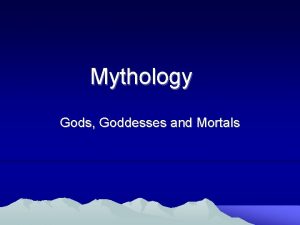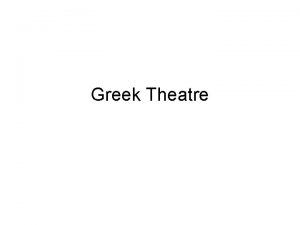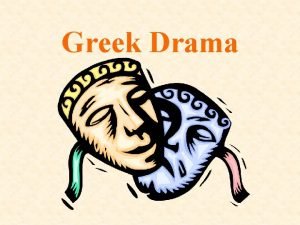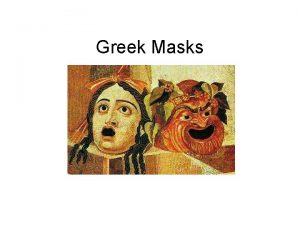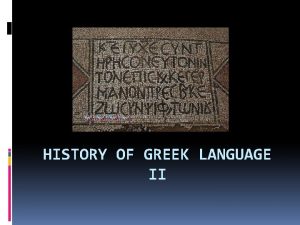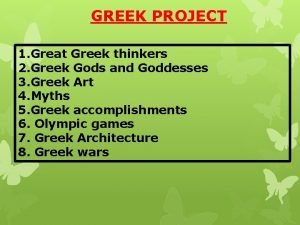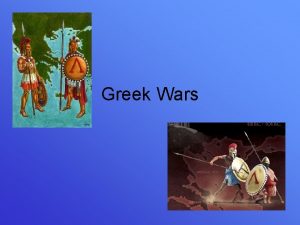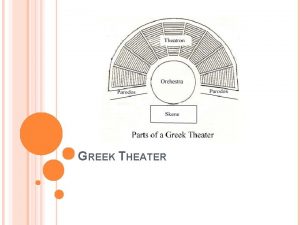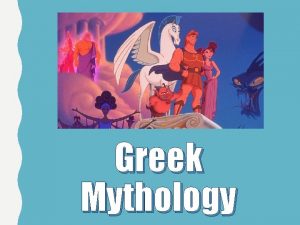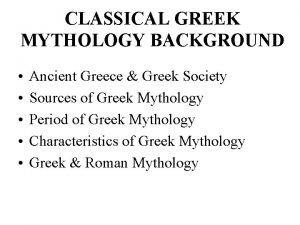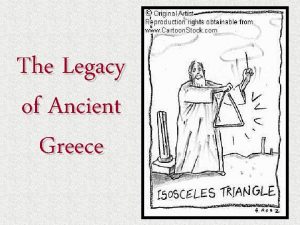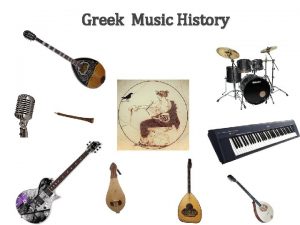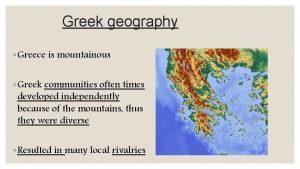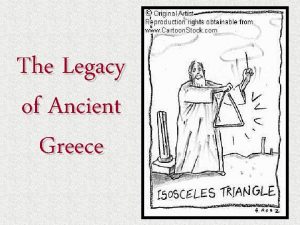Education in Greece Education in Greece The Greek

























- Slides: 25

Education in Greece

Education in Greece The Greek educational system is mainly divided into three levels: o primary, o secondary o an additional post-secondary level providing vocational training and o tertiary

Primary Education Primary education is divided into: Ø kindergarten lasting one or two years (ages 4 to 5), and Ø primary school spanning six years (ages 6 to 12)

Secondary education comprises two stages: 1. Gymnasio (variously translated as Middle or Junior High School), a three-year school, 2. Lykeion (an academically oriented high school) or Vocational training.

Higher Tertiary education is provided by: ü Universities and Polytechnics, ü Technological Educational Institutes and ü Academies which primarily cater for the military and the clergy

Duration of the Studies ü Undergraduate courses typically last 4 years (5 in polytechnics and some technical/art schools, and 6 in medical schools), ü postgraduate (MSc level) courses last from 1 to 2 years and ü doctorates (Ph. D level) from 3 to 6 years.

Ministry of Education All levels are overseen by the Ministry of Education, Research and Religious Affairs. The Ministry exercises centralized control over state schools, by prescribing the curriculum, appointing staff and controlling funding.

Private schools also fall under the mandate of the Ministry, which exercises supervisory control over them.

Tertiary institutions are nominally autonomous, but the Ministry is responsible for their funding, and the distribution of students to undergraduate courses.

Free Education State-run schools and universities do not charge tuition fees and textbooks are provided free to all students

Higher Tertiary education A normal school-day starts at 8. 15 and finishes at 14. 10. The classes last between 45 minutes. The school year always starts on September 11 and ends on June 15. The students have summer vacation (about 3 months), Christmas vacation (2 weeks) and Easter vacation (2 weeks).

General Lyceum – Senior High School 1 st grade, age 15 to 16 Obligatory Subjects 1. Ancient Greek (5 h) 8. Biology (2 h) 2. Modern Greek Language (2 h) 9. History (2 hours) 3. Modern Greek Literature (2 h) 10. Political Studies (3 h) 4. Algebra (3 h) 11. Religion Education (2 h) 5. Geometry (2 h) 12. Project (2 h) 6. Physics (2 h) 13. Foreign Language (2 h) 7. Chemistry (2 h) 14. Physical Education (2 h)

General Lyceum – Senior High School 1 st grade, age 15 to 16 Subjects of selection 1. Applications of Computer Science (2 h) 2. Geology and Management of Natural Resources (2 h) 3. Greek and European Culture (2 h) 4. Art Education (2 h)

General Lyceum – Senior High School 2 st grade, age 16 to 17 Obligatory Subjects 1. Ancient Greek (2 h) 9. Computers (1 h) 2. Modern Greek Language (2 h) 10. History (2 h) 3. Modern Greek Literature (2 h) 11. Philosophy (2 h) 4. Algebra (3 h) 12. Political Education (2 h) 5. Geometry (2 h) 13. Religious Education (2 h) 6. Physics (2 h) 14. Project (1 h) 7. Chemistry (2 h) 15. Foreign Language (2 h) 8. Biology (2 h) 16. Physical Education (1 h)

General Lyceum – Senior High School 2 st grade, age 16 to 17 The students can choose 1 of the 2 Orientation Groups: the Humanities or the Sciences

General Lyceum – Senior High School 2 st grade, age 16 to 17 Subjects of the Humanities Orientation Group 1. Ancient Greek Language and Literature (3 h) 2. Basic Principles of Social Science (2 h)

General Lyceum – Senior High School 2 st grade, age 16 to 17 Subjects of the Sciences Orientation Group 1. Physics (3 h) 2. Mathematics (2 h)

General Lyceum – Senior High School 3 st grade, age 17 to 18 Obligatory Subjects 1. Religion Education (1 h) 6. Greek Literature (1 h) 2. Foreign Language (2 h) 7. Biology (2 h) 3. Physical Education (2 h) 8. Mathematics and Statistics (2 h) 4. History (2 h) 9. History of Social Sciences (1 h) 5. Greek Language (2 h)

General Lyceum – Senior High School 3 st grade, age 17 to 18 Subjects of selection 1. 2 nd Foreign Language (2 h) 2. Drawing (free or linear) (2 h) 3. History of Art (2 h) 4. Business Management and Organization (2 h)

General Lyceum – Senior High School 3 st grade, age 17 to 18 The students can choose 1 of the 3 Orientation Groups: ü the Humanities ü the Economical and Computer Studies or ü the Sciences

General Lyceum – Senior High School 3 st grade, age 17 to 18 Subjects of the Humanities Orientation Group 1. Ancient Greek Language (5 h) 2. Latin (3 h) 3. History (3 h) 4. Literature(2 h) 5. Sociology (2 h)

General Lyceum – Senior High School 3 st grade, age 17 to 18 Subjects of the Science Studies Orientation Group: 1. Mathematics (5 h) 2. Biology (2 h) 3. Physics (3 h) 4. Chemistry (3 h) 5. Computers (2 h)

General Lyceum – Senior High School 3 st grade, age 17 to 18 Subjects of the Humanities Orientation Group 1. Ancient Greek Language (5 h) 2. Latin (3 h) 3. History (3 h) 4. Literature(2 h) 5. Sociology (2 h)

General Lyceum – Senior High School 3 st grade, age 17 to 18 Panhellenic national examinations

Panhellenic national examinations The students must take the Panhellenic national Examinations to proceed to the Higher Tertiary education. These exams are held after the students have received their Apolytirion (the main school-leaving certificate for secondary education). The students pass into a specific Higher Educational Institute based on the Orientation and Group chosen.
 Welcome to greece in greek
Welcome to greece in greek The greek miracle
The greek miracle Hình ảnh bộ gõ cơ thể búng tay
Hình ảnh bộ gõ cơ thể búng tay Frameset trong html5
Frameset trong html5 Bổ thể
Bổ thể Tỉ lệ cơ thể trẻ em
Tỉ lệ cơ thể trẻ em Gấu đi như thế nào
Gấu đi như thế nào Thang điểm glasgow
Thang điểm glasgow Hát lên người ơi alleluia
Hát lên người ơi alleluia Môn thể thao bắt đầu bằng chữ đua
Môn thể thao bắt đầu bằng chữ đua Thế nào là hệ số cao nhất
Thế nào là hệ số cao nhất Các châu lục và đại dương trên thế giới
Các châu lục và đại dương trên thế giới Công thức tính thế năng
Công thức tính thế năng Trời xanh đây là của chúng ta thể thơ
Trời xanh đây là của chúng ta thể thơ Mật thư tọa độ 5x5
Mật thư tọa độ 5x5 101012 bằng
101012 bằng Phản ứng thế ankan
Phản ứng thế ankan Các châu lục và đại dương trên thế giới
Các châu lục và đại dương trên thế giới Thơ thất ngôn tứ tuyệt đường luật
Thơ thất ngôn tứ tuyệt đường luật Quá trình desamine hóa có thể tạo ra
Quá trình desamine hóa có thể tạo ra Một số thể thơ truyền thống
Một số thể thơ truyền thống Cái miệng bé xinh thế chỉ nói điều hay thôi
Cái miệng bé xinh thế chỉ nói điều hay thôi Vẽ hình chiếu vuông góc của vật thể sau
Vẽ hình chiếu vuông góc của vật thể sau Biện pháp chống mỏi cơ
Biện pháp chống mỏi cơ đặc điểm cơ thể của người tối cổ
đặc điểm cơ thể của người tối cổ Giọng cùng tên là
Giọng cùng tên là

